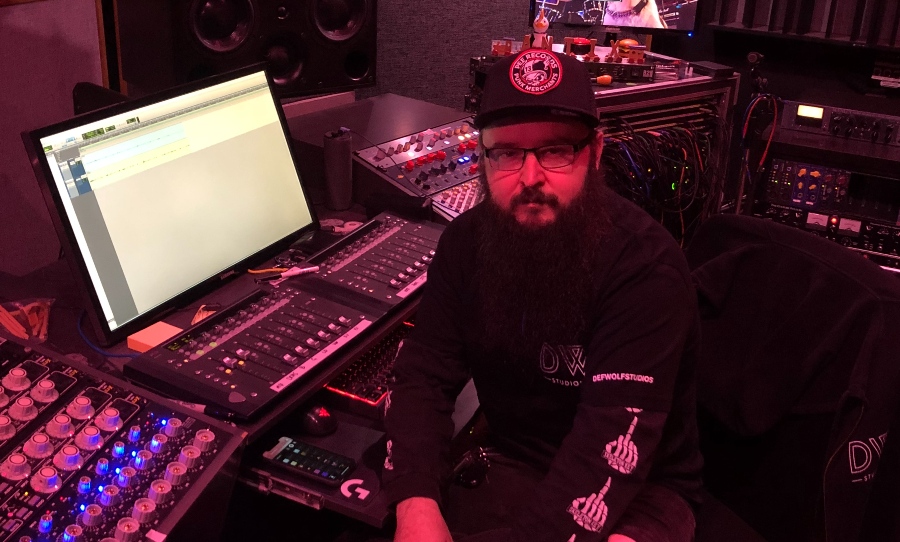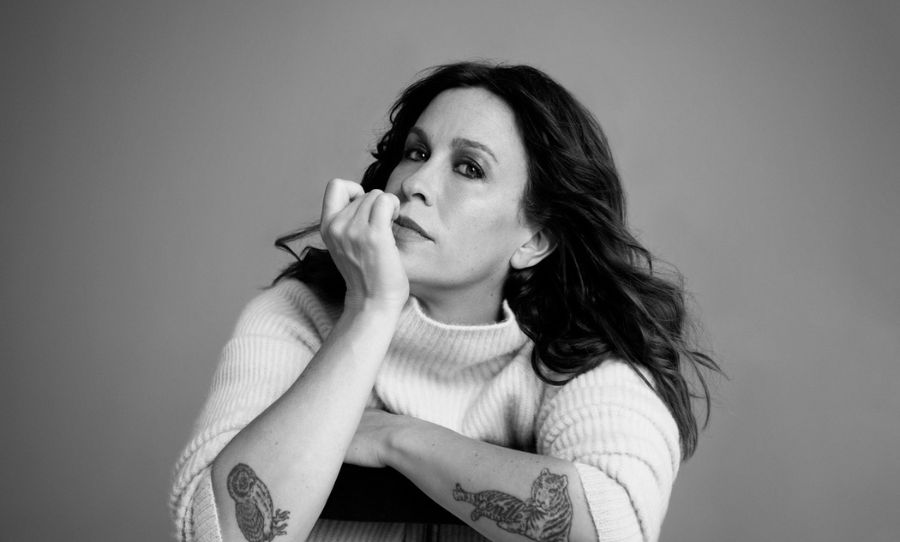Daniel Antix from Sydney’s Def Wolf Studios has a no-nonsense chat with us about what drives him, his varied journey in audio, and the making of his studio.
Def Wolf Studios manager and beard-enthusiast Daniel Antix has been bringing his down-to-earth sensibility to Sydney’s music scene for nearly twenty years. Pumping out records with some of the finest local talent, as well as interstate hotshots, he has risen through the rubble of Sydney’s knocked down recording studios to be at the helm of some of the most prolific creative spaces this city has seen since the ’80s.
Gracing his studios recently Scabz, Pist Idiots and even the legendary Angus Young, to name a few. Daniel took some time out to chat with us about how today’s Def Wolf Studios came to be, booming business through the COVID-19 pandemic, as well as the most important part of a studio: crafting inspired recordings.
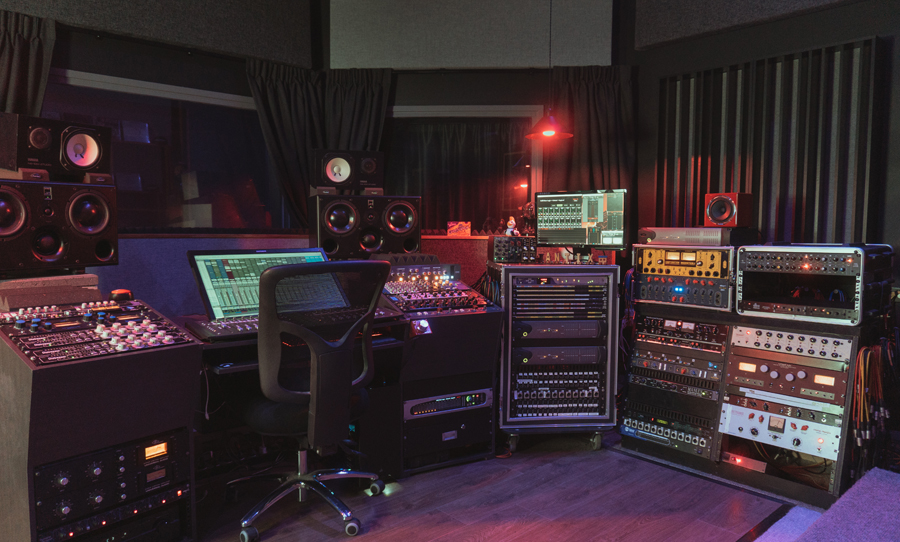
ENMORE AUDIO: How did you decide on audio as the thing to do?
DANIEL: From an early age, I always knew music was going to be my career path. The first time I went to a recording studio I was a teenager in my band, I was just like, “This is what I want to do.” Even though it was just a piece of shit hard disk 8-track recorder with a dude that didn’t know what he was doing. I think I was what would have been year 11 at the Australian Institute of Music High School. I switched straight out of year 11 into the audio degree — the high school there was a bit of a joke. So it was good to get out and just get into the audio world, haven’t looked back.
ENMORE AUDIO: Tell us a bit about your early career.
DANIEL: When I left uni, I worked in talkback radio for six years making commercials and stuff like that. I started a side hustle when I was there with one of the creative writers. I recorded and produced the advertisements he was writing. Because we were both musical, we started writing jingles and all that. Because we had access to these clients, we’d pitch our jingles to them. In my early 20s, I was also a hard dance producer and DJ in the Sydney underground rave scene.
I had a little studio on the side. Actually, my studio moved out of the home before I did! I took it to my mate’s place, worked out of there, and I started building up clients. It got to the point where it was too much to do a full-time job and run the studio, so I took the punt and told the radio station to get fucked and moved on.
ENMORE AUDIO: So, when did Def Wolf Studios come into the picture?
DANIEL: Def Wolf Studios actually came along a lot later. When I left the radio station, I went in with a mate who was running a rehearsal studio called The Lockup. That was in Sutherland and I ran the studio out of there for about 5 years. The rehearsal side of things was pretty run down, all the attention went to the studio. It outgrew the rehearsal space, and an opportunity came up to take over a local studio called Origami Studios, with the hope of running my own thing there.
At the last minute, the building changed hands and they wouldn’t give us more than a one-year lease. I’d just produced the Gay Paris record Ladies and Gentlemen, May We Present To You, The Dark Arts, which Dave Hammer from Def Wolf at the time, mixed. He just happened to say “Hey I’m looking for someone to share my space, do you wanna come in?” A few years later he moved on, and I took over Def Wolf. We’re still good mates to this day and still work on things together.
ENMORE AUDIO: What was that first Def Wolf Studios space like?
DANIEL: I brought in all my own gear — the space built by Troy Horse Studios back in the ’80s for anyone that remembers. It was above FBi radio station on Botany Road in Alexandria. It was a cool space, it had a good vibe and everyone was comfortable there. That’s what we tried to re-create here in Kurnell, but this space is still very different. With higher ceilings and bigger rooms, we can do more acoustically. Saying that, I still listen back to records I made at the previous Def Wolf Studios and I love that old drum room, but what we’ve built here is pretty awesome.
ENMORE AUDIO: Why have a permanent studio to call home, as opposed to freelancing out of other studios?
DANIEL: I don’t know! I’ve always had my own place and my own gear, that little studio I started at home kept growing. I’ve wondered about that sometimes, I don’t quite know, it’s just how it happened. I never really worked under someone or interned anywhere, I did my own thing. Guess it might have come from that? My main focus while at uni was producing and mixing my own music, as well as releasing them on labels here and in the UK. People heard and liked my work enough to work with me, rather than me going out and working for someone else.
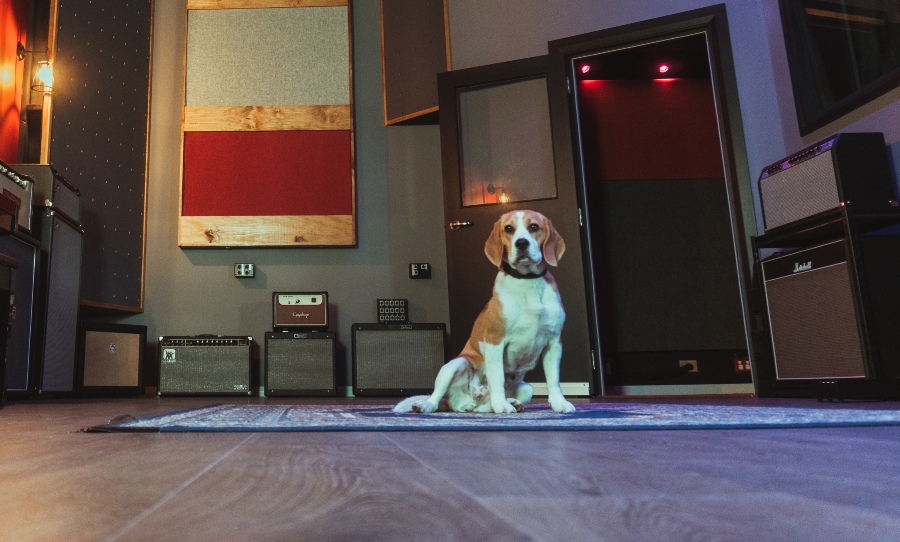
ENMORE AUDIO: What’s it like running a space like Def Wolf Studios in the age of the bedroom producer?
DANIEL: I embrace bands doing shit at home, and I always give them options because budgets are on people’s minds. So I try not to fight it, because it can come in handy. If someone has the ability to record guitars or something at home, at least they use DIs, they can then come in and re-amp, y’know? Something that could take three or four days in the studio, they could do three or four days at home instead, and then come into Def Wolf Studios and re-amp for just one day.
We’re running Pro Tools here — it’s not like we’re running 2-inch tape machines. If someone’s got the ability to do it, they’re just bringing something else to the table then on the record. Maybe it’s not something that was as common 30 years ago, but the evolution of how music is made has changed, so don’t fight it. Change with the times, stay relevant!
ENMORE AUDIO: How often do you use tape? I see this Studer tape machine sitting gloriously here.
DANIEL: Nup. Never. Ha! That’s going to go into storage I think, for a little while. I wanted to get it up and running but the studio’s been too busy. We just had a kid as well, so I don’t have the extra time I use to have. So I think I’m just gonna pack it up and put it into storage for a couple of years, take a look at it then. I wouldn’t sell it, I’d like to use it one day, aside from the fact that if I got rid of it I might never get something like it again. It’s like having that old car in your garage like “oh one day I’ll fix it up.” I just need to take it out of the room, it’s taking up too much real estate.
ENMORE AUDIO: We understand you had the current premises built from the ground up. What did that involve?
DANIEL: My old man owns a building company, so that was a huge help. If it wasn’t for that, we probably wouldn’t be here. I had an idea of what I wanted to be done, and how I wanted the rooms laid out. I sat down with his builders and suppliers and we turned what was in my head into a working, functioning reality. I had some good advice from people who have built studios in the past like Sammy Kannis. He said things like “I think you should do this, think you should change this here.” I took everything people said on board and did it, and I’m glad I did because I’m really happy with the way these rooms turned out.
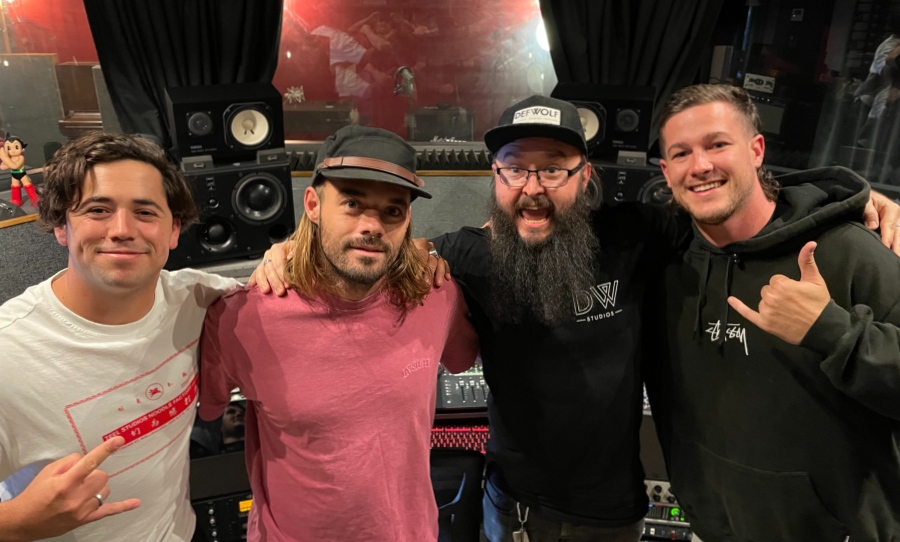
ENMORE AUDIO: So no hot-shot acousticians to design? Did you do that yourself?
DANIEL: Yeah, I did a bit of the maths and calculations. My bachelor’s degree in audio covered acoustics so I know a bit about that. I’d call it ‘acoustics common sense’. It seemed to work out!
ENMORE AUDIO: Did you make changes to anything in the business with the foresight of what could have happened in 2020?
DANIEL: When it all first started to hit, I did a bunch of sessions via Facetime and Zoom. I’ll admit I’d never heard of Zoom till COVID. Man, I know our industry took a bad hit and they’re a lot of people struggling, but we’ve had a good year. I know we’re lucky in that sense, but I guess there were a lot of artists who couldn’t get out there and tour, so they got creative instead. Writing records or just putting out some singles. We had a few bands come in and do some live shoots down here in lieu of touring like The Dead Love, and Grenade Jumper.
I don’t really feel like we did anything different. I thought that we’d feel the strain. There were a few interstate bands that had to cancel or postpone, to which I think most of them have been sorted. I did worry because I play in a touring band — I’d say a third of my work is bands from interstate artists. I was still receiving records to mix and master. Moving back to the Shire — where we weren’t just another studio in the city — has helped. There’s a good music scene down here, a lot of young bands. We’ve been busier now more than ever. Hopefully, that trend continues!
ENMORE AUDIO: What has been key for you, from starting at AIM to now operating a space like Def Wolf Studios?
DANIEL: The music. I treat every artist on their own merit. I don’t have a set way of doing things. We’ll get a band in one week and we’ll record everything live — no click track. Just go for it. Pump out the record with that live feeling then do some overdubs and touch-ups. Then the next week, it could be a band where everything is to the click, recorded separately, edited, and massaged. You’ve gotta do what’s best for the song.
ENMORE AUDIO: With that in mind, how do you approach each session with your artists?
DANIEL: I usually start by saying something like, “send me some demos!” or “do you have any demos” or “let’s do some demos.” I find — going back to bedroom producers — most bands have the ability to do some sort of demo at home now. This is good because I always say to bands that the most important stage is pre-production. So you know your songs, inside and out, you know the arrangement is the best it could be, and you know your parts. So that way when you come to the studio you’re not like “Oh shit, you’re playing a C there, and I’m playing a B.”
Which look, it does still happen. Maybe not to the extent it would if they didn’t prepare. If a band comes in wanting to do a collection of songs like an EP, I’ll always try to get at least a day of pre-production in. I like to do that a month or more before the project starts so the artists have time to sit on the songs and think about them. It’s one thing to sit in a room playing with each other, then another is hearing it back the next day. Everything always feels good in the moment.
ENMORE AUDIO: What have been some of the challenges in running Def Wolf Studios?
DANIEL: It was hard moving out of Alexandria. They didn’t want us in that building — they didn’t want any remnants of Troy Horse. The building managers were clearing out all the artistic types and wanted to put suits and shit like that in. Rent was getting ridiculous. It was just another challenge. This warehouse came up and once we got rolling and everything council approved, it’s been smooth sailing.
The 10 months of downtime between leaving the old place and getting this place up and running was fairly frustrating. It was painfully slow getting things through council. Anyone who has had to build anything and getting council approval will know what I’m talking about. You wait three months for them to come back and say “Oh, you don’t have where you’re going to store your bins on the plan.”
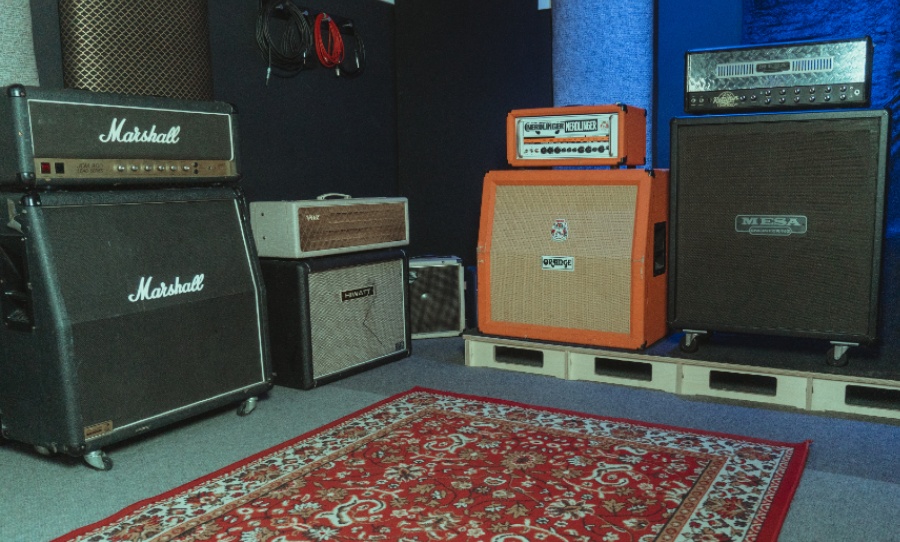
ENMORE AUDIO: On that note, why Kurnell?
DANIEL: Literally, there were two warehouses available for purchase when we were looking for our location. There was Peakhurst and Kurnell, I went to the Peakhurst inspection first, there were about thirty people there. The first thing the agent said when we walked through the door was “Oh, because of the interest, the price has gone up.” Ok thanks, yep, see ya! Kurnell it is.
ENMORE AUDIO: What advice do you have for the young guns of audio, before hitting uni or something along those lines?
DANIEL: Interning. YouTube. Embrace the bedroom. Get your own thing happening at home! Get Pro Tools, or Reaper, or whatever the fuck you want to use, it doesn’t matter. Just get something that works for you.
ENMORE AUDIO: How hard has the business side of things been for you over your time operating Def Wolf Studio?
DANIEL: I would say that anyone doing this kind of thing should get an accountant and software. Like Xero or any software like that, it helps keep all your things in order.
ENMORE AUDIO: What are the most exciting parts of working in audio, or even operating a space like Def Wolf Studios?
DANIEL: I guess even on bad days, I’m like “Well at least I’m not sitting behind a desk pushing a pen or something like that.” I think I’m pretty lucky to do music as a living, as something I love. I love coming to work every day. I’m here like 15 hours a day most days, but that’s part of the job. I love it, I wouldn’t want to do anything else. It’s great working with young bands who are making noise in their scenes too. I’ve got a good current crop of artists like Radicals, Scabz, Satin Cali and Clay J Gladstone all doing well out there at the moment. We had Totally Unicorn here early last year, they were doing a writing weekend. Nerdlinger was doing the same thing. It’s funny how everyone was going through the same frustrating writing process. We’ll go outside, they’re having beers and then we’ll be having beers, and some crazy shit went on.
ENMORE AUDIO: Any groovy things you’ve been working on recently?
DANIEL: Last year Pist Idiots did their album here with Chris Collins producing. It’s not out yet but a couple of singles have been released. Geroge Georgiadis, one of the other engineers here at Def Wolf Studios had The Whitlams here earlier last year. I think was the first time they’d been in the studio together for 12 years or something. We did all the pre-recorded press material and live to air broadcasts for German TV for the new AC/DC record. So we had Angus here for a couple of months, doing interviews with various outlets around the world all via Zoom, for either TV or radio because of travel restrictions. I was in charge of recording all that audio and they had a film crew in as well. The Scabz record was also a good one, also had Clay J Gladstone and Satin Cali recently.
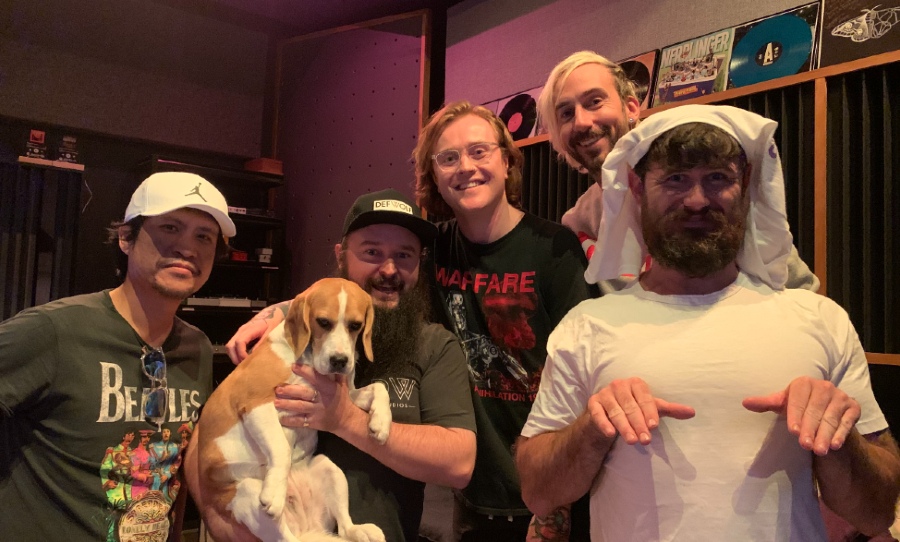
ENMORE AUDIO: Has your gear changed much over the years?
DANIEL: I got rid of the console a fair while ago now. The upkeep and footprint of the console weren’t worth it. I’m running an SSL Sigma Summing Mixer. We’ve got an Avid HDX rig with 40 I/O and a lot of outboard gear, so when I mix it’s a hybrid setup. The configuration might change and stuff moves around to make it easier to use. When recording, I’m kind of mixing the record as I go. When you record at home, you might just go straight off the pres and then go in and manipulate it later. I say to bands when we start capturing a sound, “it might take us a bit longer to set up and get these sounds, but this is how the record’s going to sound.” It’s not like we’re going to record it, then mix it to then have it come back completely different. We start shaping the record from the beginning, that’s my philosophy.
ENMORE AUDIO: Have you been buying new gear or implementing new technologies recently at Def Wolf Studios?
DANIEL: I’m always buying gear — too much gear! Also things like new plugins. At the moment there’s all this new stuff coming in like Soothe and Spiff and Gullfoss. They’re kind of more intelligent or something like that. I’ll try things! Sometimes they work, sometimes they don’t. They’re definitely a good tool to have. Especially if you’re getting tracks to mix that wasn’t recorded in a studio. That’s probably why plugins like that have come about. They have a place as a tool to fix things. Sometimes I might find that I can get another use out of them other than what it was intended for.
ENMORE AUDIO: What are your favourite bits of equipment here?
DANIEL: I’d have to say my Curve Bender. It lives on my mix bus. Just got some Burl B2 Bomber capture converters, which I’m a big fan of. Once I started running them, I was like “oh, where have you been all my life!” I like the sound of them pushed, and the clipping in them is something I like to hear in my masters.
I actually swapped out some Great River EQs that weren’t doing it for me, just did a straight swap and I’m feeling pretty good about them. The Culture Vulture as well, I love mine. I had it modified to have a mix knob on it, if I could have four of them I would!
ENMORE AUDIO: Looking towards the future, how does the pipeline look?
DANIEL: It’s not really something I think about. I just do my thing and not worry about that too much. Take it as it comes, when your busy it’s freaking busy. Then when it’s quiet, I’ve definitely been there and thought “…fuck.”
ENMORE AUDIO: What’s been some of your favourite things to record?
DANIEL: Had a lot of fun with the Scabz record last year, we did some wacky stuff. We tracked everything live and then overdubbed some extra guitars and whatnot. I was trying not to just double track guitars in that time, we would set up two guitar rigs and a stereo room mic. Actually, I think a lot of the cleans on that record — a lot of the guitar tones — is mostly a stereo room mic with a little bit of the close mics mixed in.
It was a challenge I set for myself because it’s quite common to double-track guitars these days. We did some crazy shit — like Von would get down under the piano and would bang on the strings and we’d run that through the Culture Vulture. Had a manic week with Clay J Gladstone — did five or six songs in less than a week. We punched through that record, we got really creative, especially with vocals. We’d pull out a megaphone and the Shure Green Bullet, and ran vocals through guitar amps. That philosophy of ‘how we record it is how it’s going to sound’ really kicked in. These vocals are going to be distorted here, so lets fucking distort them!
ENMORE AUDIO: What pushes the creativity in those situations?
DANIEL: You get a bunch of creative people in the same room who aren’t afraid to take chances. You’ll push each other to do crazy stuff. By the end of it you think “I’m not quite sure how that happened but it did, and it sounds great.” There are times we do things and I think “oh that doesn’t work.” It’s a very ‘in the moment’ thing — sometimes you get to a point where you’ve been recording for three days and then you think “Shit. Is this the right way to do this? Have I fucked this up?” But then you go to mix and think “No. This sounds fucking rad, this is cool!”
ENMORE AUDIO: Lastly, what is your favourite record of all time, and why?
DANIEL: I think growing up Siamese Dream, Smashing Pumpkins. I just think it’s immaculate, the production on it is awesome. Mellon Collie also was the record that made me realise music was what I wanted to do. I still remember the day I got that and sat in front of the stereo and listened to it three times. It’s a two-hour record so that’s six hours in front of the stereo. But when I discovered Siamese Dream I was blown away. I would’ve been 10 or 11 when that came out I was probably a little too young for it.
Being the eldest, I didn’t have anyone to say “hey, you need to listen to this.” I had to discover everything myself. I don’t love every song on Siamese Dream, but I think a sign of a good record is that they push boundaries and that you might not like everything. Man, I would love to spend that amount of time on a record too. I listened to a podcast featuring Alan Moulder (the mix engineer) and they were taking something like three days mixing each song.
Visit Def Wolf Studios for more details.
